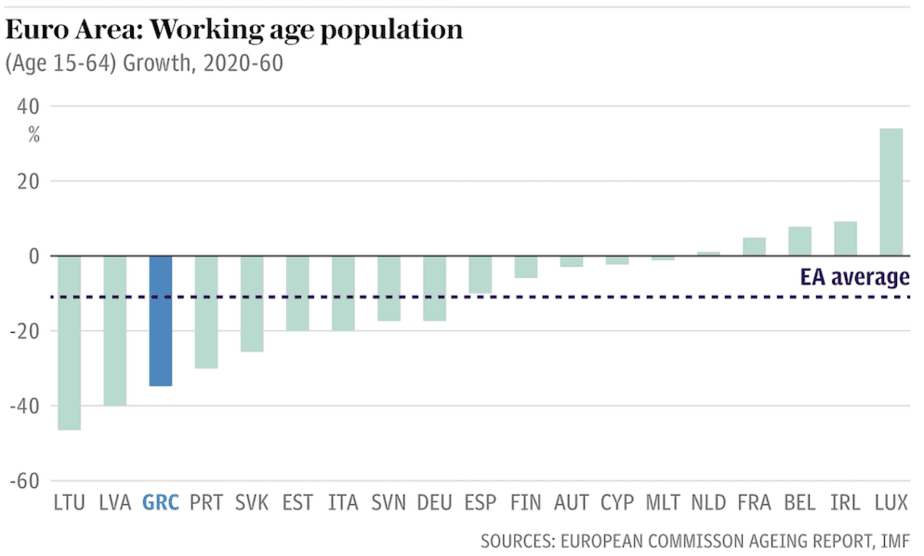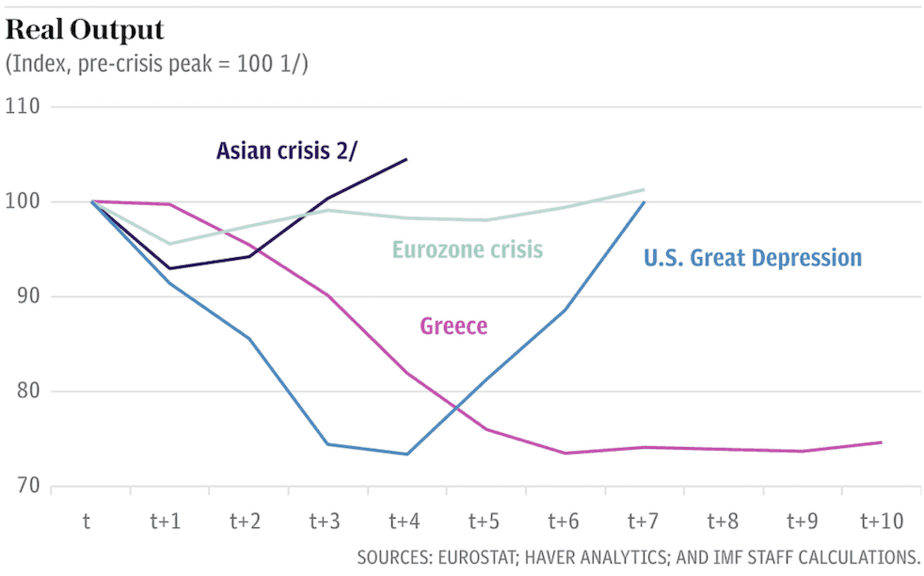Märchen von der “Griechenland-Rettung” entlarvt
Griechenland ist gerettet und damit ein Musterbeispiel für gelungene Politik in Brüssel, Paris und Berlin. Alle haben dabei gewonnen und sogar die Geldgeber haben daran verdient. Es ist eine Leistung, die an ein Wunder grenzt und voll und ganz unseren umsichtigen, mutigen und besonnen agierenden Politikern zu danken ist. Wer so gut regiert wird, dem muss angesichts der Krisenherde in der Welt nicht bange werden. Gut, dass wir keine Amtszeitbegrenzung haben. So können wir noch lange davon profitieren.
Okay, ganz so war es dann doch nicht in den deutschen Medien, aber fast. Nur im Wirtschaftsteil wurde gelästert, aber wer liest den schon?
Erfrischend, wenn auch nicht ermutigend, im Gegensatz dazu Ambroise Evans-Prichtchard, der im Telegraph die Fakten zusammenschreibt:
- “If all goes perfectly, Greece will struggle through the 2020s and early 2030s on the edge of insolvency, still under the tutelage of the foreign commissars. In 2060 it will finally emerge from a half century of austerity just as bankrupt as it is today, with a public debt of 180pc of GDP.” – bto: Wer angesichts solcher Aussichten im Land bleibt oder gar dort investiert, dem ist nicht zu helfen.
- “Even this is based on the heroic assumption that the world economy will motor ahead at trend growth rates for 50 years and that nothing will go wrong.” – bto: Pah, was soll schon schiefgehen?
- “The Commission tortures every key variable to make the figures add up for Greece and to pretend that there is no need for a debt write-off. It offers false hope to the Greek people. It perpetuates the self-serving lies over the last eight years that have so sapped the moral authority of the EU institutions.” – bto: Wunder brauchen eben manchmal eine etwas flexiblere Definition der Wahrheit.
- “The International Monetary Fund demolishes the EU claims in its own analysis. ‚Improvement in debt indicators can only be sustained over the long run under what appear to be very ambitious assumptions about GDP growth,‘ it said. ‚It could be difficult to sustain market access over the longer run without further debt relief.‘” – bto: Ja, aber dann sind wir doch schon lange im Altersheim und haben das vergessen. Frau Merkel und Herr Schäuble sowieso.
- Das hat auch damit zu tun, dass die Träumer/Optimisten/Lügner in der EU die Folgen des demografischen Wandels (wieder einmal) vergessen: “The workforce will contract by 1.1pc each year for four decades. Economic trend growth is minus 0.4pc. The IMF doubts that reform can lift this much higher. The draconian retrenchment gutted investment and drove the country’s educated youth into exile, lowering the long-term speed limit of the Greek economy.” – bto: Das wird so gerne vernachlässigt und ist der entscheidende Faktor für die künftigen Wachstums- und Wohlstandsaussichten.
Passend dazu zeigt der Telegraph ein Chart, das auch für das “reiche Land” Deutschland eine Mahnung ist:
- “‚It has been an enormous policy disaster,‘ said Professor Charles Wyplosz, the expert brought in by the IMF’s watchdog to review the sorry episode. ‚People compare this to the Great Depression in the Thirties but that was a nice walk in a beautiful forest by comparison. Nothing like this has ever happened before to a developed economy.‘” – bto: Dazu muss man natürlich sagen, dass das griechische BIP durch die vielen Kredite zuvor enorm aufgebläht wurde. Der Einbruch ist trotzdem real, muss aber so relativiert werden. Der Vergleich mit den 1930ern stimmt übrigens:
Quelle: The Telegraph
- “‚When the crisis began in 2010 the debt ratio was 120pc of GDP. Eight years later it is 180pc and the Greek economy has shrunk by a quarter. The outcome is as a bad as it could possibly have been, and the problem is certainly not solved. If you cook the assumptions, you can claim anything is sustainable.
What the Europeans have now done is put Greece to sleep under anaesthesia but when the people wake up and feel the pain they are going to be very angry. Economically it is nonsense, and politically it is shameful.‘” – bto: und zwar für beide. Die Griechen und die Geldgeber. - “The original sin of the EU-IMF troika was to foist bailout loans on Greece – in violation of the IMF’s own rules – when it was already insolvent. The country needed debt cancellation of 50pc to restore viability, given that the cure of devaluation was blocked. This was done entirely in order to save Europe’s banks and the euro at a time when the eurozone had no firewall against contagion and no functioning lender of last resort. It still lacks such a backstop, as will become clear when the ECB halts bond purchases at the end of this year.” – bto: Italien wird so nicht funktionieren!
- “Needless to say, there is no chance that Greece will muddle through until 2060. The next global economic downturn will push the country back into recession and blow up the debt trajectory. Indeed, it is an open question whether the eurozone itself can weather another slump, given that the ECB has exhausted its monetary powder and there is still no fiscal union to stabilise the system. The glaring risk is that Italy’s insurgent coalition – armed with its “minibot” parallel currency – will set off a chain of events that causes the rupture of monetary union.” – bto: Der einzige Grund, weshalb ich nicht mehr sicher bin, dass es so kommt, ist der, dass es mittlerweile Common Sense ist. Der Euro scheitert anders.
- “In which case, Greece will be forced out of the euro as a collateral casualty. All the sacrifice and national humiliation since 2010 will be have been pointless. Greece may get its drachma whether it wants it or not.” – bto: Und sicherlich werden unsere Politiker auch dann noch behaupten, wir hätten einen Gewinn gemacht – und unsere Medien werden es wiederholen – und die Bürger werden es glauben. Oder zumindest glauben wollen, wenn sie auf den Zustand der maroden Schulen im Lande blicken. Denn nicht vergessen: Unser Steuergeld hat französische Banken gerettet.
→ The Telegraph: “Greece will not escape debt servitude until the euro is destroyed”, 22. August 2018









